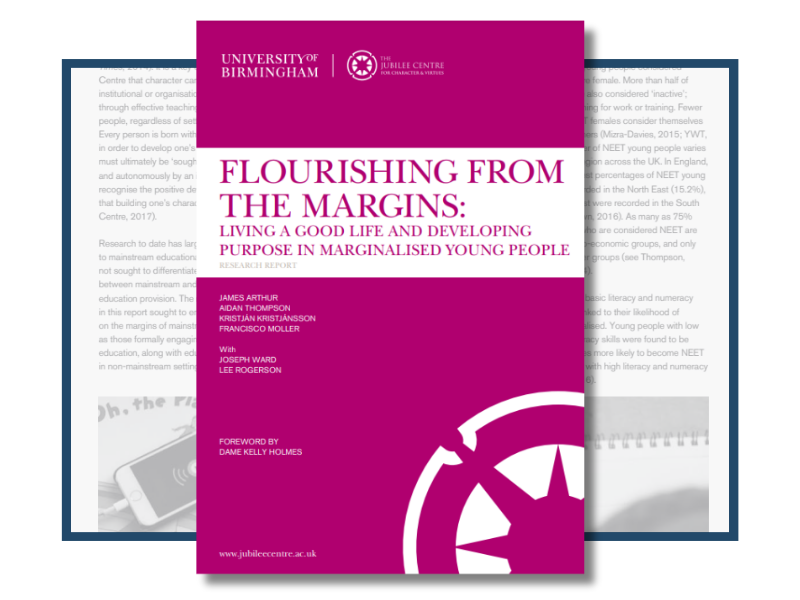Project Overview
The Flourishing From the Margins project was launched on 26th October in the University of Birmingham Senate Chamber by Ian Webber, Managing Director of Rathbone Training UK. Working with a combined dataset of nearly 3,250 young people from mainstream and non-mainstream, marginalised and non-marginalised, educational backgrounds, including state secondary schools, academies, Pupil Referral Units (PRUs), Youth Offender Institutions, youth training organisations, and football academies, this research report aims to give a ‘voice’ to young people on the margins
of education.

In addition to the research report available (right), a film was produced to capture the ‘voices’ of some project participants, both young learners and tutors. The film and resources are available below.
The Jubilee Centre would like to thank all of the contributors involved in the film, particularly the young people from Rathbone Training UK, the Martin O’Connor Education and Football Academy and City of Birmingham School. We would also like to thank tutors Gary Belcher, George Belcher, Robert Kennedy at MOCEFA, Damian Peel, Gillian Wardaugh, and Leigh-Anne Elliott at Rathbone Training UK, and Rachel Bennett and Nikki Thomas-Tapper at City of Birmingham School.
As part of the project, a suite of teaching resources have been created, rooted in existing Jubilee Centre materials for the teaching of character, for use in non-mainstream education settings. The resources are available via the button on the right.

Summary of Key Findings
- Participants in non-mainstream provision (27.4%) showed greater indications that they
had a sense of purpose in life than those in mainstream settings (24.2%). - More than half of all participants felt that they understood their life’s meaning, and nearly
two-thirds of participants indicated that they had a good sense of what made their life meaningful. - Participants categorised as ‘having purpose’ reported that family and friends, and
particularly teachers and members of the community, had a greater and more positive influence on their sense of living a ‘good life’. - Tutors in non-mainstream settings considered their roles as character educators carefully, and reported that adopting a character-led approach to teaching (Stage Two) challenged them to
consider their own character development in addition to that of their learners.
Summary of Key Recommendations
- non-mainstream education providers should dedicate time and space within their curricula to character education opportunities for their learners;
- people in positions of responsibility for developing and delivering non-mainstream
education curricula should consider developing a culture and ethos of character and virtues within their organisation or setting; - providers working with marginalised young people should consider using the teaching
materials used in Stage Two of this research project, which are available here.
Appendices
The online appendices for the Flourishing From the Margins report can be downloaded below:
Project Summary

Project Overview
The Flourishing From the Margins project is designed to deepen understanding of why some young people appear marginalised from mainstream education, or have become ‘NEET’ altogether, and how paying attention to character may help to address some of the underlying causes of that marginalisation.
This work will contribute to understandings of character amongst marginalised young people and how interventions may support the character development of the difficulties that some marginalised young people face with regards to developing a sense of purpose and living a ‘good life’.
Read our Virtue Insight blog post on the ‘Polarised debate that pits moral responsibility against social conditions is creating a “damaging impasse”
Methodology
The research has used a mixed methods approach, undertaken across 3 Stages:
- Stage 1: A questionnaire completed by young people from both mainstream and non-mainstream settings (n=2,910) to understand young people’s perceptions of who and what influence their idea of living a ‘good life’ and whether they have a sense of life purpose;
- Stage 2: The development and trial of a structured character education intervention with pre- and post- testing to assess impact (n= 108);
- Stage 3: A qualitative study of 8 young people and 6 tutors, interviewed on film and asked to describe how they have come to be where they are and how they envisage their futures.
Literature Review & Findings
Hundreds of thousands of young people in the UK become marginalised from education and employment, with costs to the individual and to wider society.
Marginalisation can be seen on a continuum from the extremes of people who are involved in illegal, hidden and antisocial behaviour, through those who have seemingly ‘lost their way’, to those who are deemed to be at risk of marginalisation but remain in mainstream settings.
The context of society has changed; there are more choices, the transition from child to adult is more fractured and complex. It seems those who have support – from schools, family, community – and have a sense of purpose may find this easier to manage, but those without these things can be left behind and marginalised.
Healthy and nurturing relationships with adults – teachers, family, mentors – seem to be a central part of young people’s engagement with society.
Project Milestones
 Stage 1 of the project surveyed 2,910 young people from mainstream and non-mainstream educational settings, and asked participants to reflect on the factors influencing their sense of what it means to live a ‘good life’, and whether they feel as though they have a positive sense of life purpose.
Stage 1 of the project surveyed 2,910 young people from mainstream and non-mainstream educational settings, and asked participants to reflect on the factors influencing their sense of what it means to live a ‘good life’, and whether they feel as though they have a positive sense of life purpose.
Stage 2 of the project undertook a trial of a character-based intervention with 108 young people engaged in non-mainstream education programmes, across the UK. Read more about the development of character education resources for marginalised young people in this blog post.
The intervention seeks to expose participants to a language of character that will help them realise their goals and develop a sense of moral purpose. They will have a clearer path and know what steps to take to move forward successfully.
Stage 3 of the project interviewed 8 young people who had participated in Stage 2, and encouraged them to tell their ‘story’ of how they had become marginalised from mainstream education, and whether they felt that they had developed a sense of purpose through engaging in non-mainstream education provision, or through education at all. The Stage also captured the voices of 6 tutors in non-mainstream education, and participants were encouraged to reflect on their roles as character educators.
